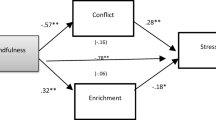Abstract
This article is based on data from two qualitative studies that examined the experiences of 93 tenure-line faculty members who are also mothers and fathers. Using gender schemas and ideal worker norms as a guide, we examined the pressures that professors experience amid unrealistic expectations in their work and home lives. Women participants reported performing a disproportionate amount of care in the home while simultaneously feeling unable to take advantage of family-friendly policies. In contrast, men acknowledged that, although their partners performed more care in the home, they felt penalized for wanting to be involved parents.
Similar content being viewed by others
References
Acker, J. (1990). Hierarchies, jobs, bodies: A theory of gendered organizations. Gender and Society, 4, 139–158.
Austin, A. (2003). Creating a bridge to the future: Preparing new faculty to face changing expectations in a shifting context. Review of Higher Education, 26, 119–144.
Bem, S. L. (1981). Gender schema theory: A cognitive account of sex typing. Psychological Review, 88, 354–364.
Budig, M. J., & Hodges, M. J. (2010). Differences in disadvantage: Variation in the motherhood penalty across white women’s earnings distribution. American Sociological Review, 75, 705–728.
Colbeck, C. L., & Drago, R. (2005). Accept, avoid, resist: How faculty members respond to bias against caregiving…and how departments can help. Change, 37(6), 10–17.
Coltrane, S. (1996). Family man. New York, NY: Oxford University Press.
Corcoran, M., & Clark, S. M. (1984). Professional socialization and contemporary career attitudes of three faculty generations. Research in Higher Education, 20, 131–153.
Drago, R., et al. (2005). Bias against caregiving. Academe, 91(5), 22–25.
Edwards, T. (2004). Cultures of masculinity. London, England: Routledge.
Elliott, M. (2008). Gender differences in the causes of work and family strain among academic faculty. Journal of Human Behavior in the Social Environment, 17, 157–173.
Emslie, C., & Hunt, K. (2009). “‘Live to work or ‘work to live’”? A qualitative study of gender and work-life balance among men and women in mid-life. Gender, Work and Organization, 16, 151–172.
Evans, E., & Grant, C. (2008). Mama, PhD: Women write about motherhood and academic life. Piscataway, NJ: Rutgers University Press.
Hochschild, A. R. (1989). The second shift: Working parents and the revolution at home. New York, NY: Viking.
Hochschild, A. R. (1997). The time bind: When work becomes home and home becomes work. New York, NY: Henry Holt & Co.
Hollenshead, C. S., Sullivan, B., Smith, G., August, L., & Hamilton, S. (2005). Work/family policies in higher education. In J. Curtis (Ed.), The challenge of balancing faculty careers and family work (pp. 41–66). San Francisco, CA: Jossey Bass.
Hunter, L. A., & Leahey, E. (2010). Parenting and research productivity: New evidence and methods. Social Studies of Science, 40, 433–451.
Kelly, K., & Grant, L. (2012). Penalties and premiums: The impact of gender, marriage, and parenthood on faculty salaries in SEM and non-SEM fields. Social Studies of Science, 42, 869–896.
Lincoln, Y., & Guba, E. (1985). Naturalistic inquiry. Beverly Hills, CA: Sage.
Manchester, C. F., Leslie, L. M., & Kramer, A. (2010). Stop the clock policies and career success in academia. American Economic Review, 100, 219–223.
Mason, M., Wolfinger, N. H., & Goulden, M. (2013). Do babies matter? Gender and family in the ivory tower. New Brunswick, NJ: Rutgers University Press.
Merriam, S. B. (1998). Qualitative research and case study applications in education. San Francisco, CA: Jossey Bass.
Misra, J., Lundquist, J. H., & Templer, A. (2012). Gender, work time, and care responsibilities among faculty. Sociological Forum, 27, 300–323.
Nakhaie, M. R. (2009). Professors, ideology and housework. Journal of Family and Economic Issues, 30, 399–411.
O’Meara, K., & Campbell, C. M. (2011). Faculty sense of agency in decisions about work and family. The Review of Higher Education, 34, 447–476.
Philipsen, M. I. (2008). Challenges of the faculty career for women: Successes and sacrifices. San Francisco, CA: Jossey-Bass.
Quinn, K. (2010). Tenure clock extension policies: Who uses them and to what effect? NASPA Journal about Women in Higher Education, 3, 182–206.
Reddick, R. J., Rochlen, A. B., Grasso, J. R., Reilly, E. D., & Spikes, D. D. (2012). Academic fathers pursuing tenure: A qualitative study of work-family conflict, coping strategies, and departmental culture. Psychology of Men & Masculinity, 13, 1–15.
Sallee, M. W. (2014). Faculty fathers: Toward a new ideal in the research university. Albany, NY: SUNY Press.
Sallee, M. W., & Harris, F., III. (2011). Gender performance in qualitative studies of masculinities. Qualitative Research, 11, 409–429.
Sayer, C. L., Bianchi, S. M., & Robinson, J. P. (2004). Are parents investing less in children? Trends in mothers’ and fathers’ time with children. American Journal of Sociology, 110, 1–43.
Slaughter, A. M. (2012). Why women still can’t have it all. The Atlantic. Retrieved from http://www.theatlantic.com/magazine/archive/2012/07/why-women-still-cant-have-it-all/309020/
Stack, S. (2004). Gender, children and research productivity. Research in Higher Education, 45, 891–920.
Tierney, W. G., & Bensimon, E. M. (1996). Promotion and tenure: Community and socialization in academe. Albany, NY: SUNY Press.
Valian, V. (2005). Beyond gender schemas: Improving the advancement of women in academia. Hypatia, 20, 198–213.
Ward, K., & Wolf-Wendel, L. (2012). Academic motherhood: How faculty manage work and family. New Brunswick, NJ: Rutgers University Press.
Williams, J. (1999). Unbending gender: Why work and family conflict and what to do about it. New York, NY: Oxford University Press.
Wilson, K. B., & Cox, E. M. (2011). No kids allowed: Transforming community colleges to support mothering. NASPA Journal about Women in Higher Education, 4, 218–241.
Author information
Authors and Affiliations
Corresponding author
Rights and permissions
About this article
Cite this article
Sallee, M., Ward, K. & Wolf-Wendel, L. Can Anyone Have it All? Gendered Views on Parenting and Academic Careers. Innov High Educ 41, 187–202 (2016). https://doi.org/10.1007/s10755-015-9345-4
Published:
Issue Date:
DOI: https://doi.org/10.1007/s10755-015-9345-4




